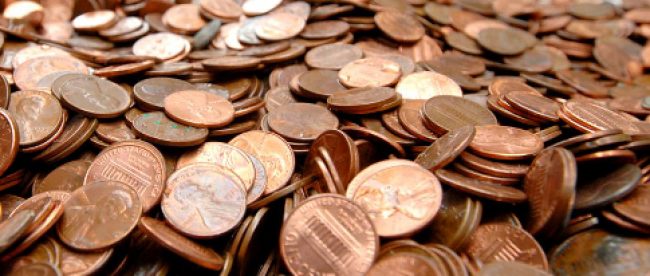A Penny (or 2,500) For Your Misdeeds

A penny is worth one cent, which is to say it’s basically worthless, but not entirely so. Gather enough of them together and you may have enough money to buy yourself a pack of gum or something — it’d be a cumbersome transaction, sure, but you’re going to get your gum at the end of it. Or… will you? If you dump 129 pennies on the counter of your local drug store or candy shop, are they going to sell you the gum, or demand that you leave?
There’s a myth out there that — in the U.S. at least — a store has to accept your pennies. They don’t have to be happy about it, but, as the theory goes, pennies are “legal tender,” and therefore have to be accepted by retailers. That’s not true, though, as the Treasury Department’s website notes, below:
There is, however, no Federal statute mandating that a private business, a person or an organization must accept currency or coins as for payment for goods and/or services. Private businesses are free to develop their own policies on whether or not to accept cash unless there is a State law which says otherwise. For example, a bus line may prohibit payment of fares in pennies or dollar bills. In addition, movie theaters, convenience stores and gas stations may refuse to accept large denomination currency (usually notes above $20) as a matter of policy.
That said, government agencies may not have that same flexibility. If you get, say, a parking ticket, and you want to pay it in pennies, your local DMV probably has to accept the piles of coins. In 2015, this specific situation made headlines when a Pennsylvania man tried to pay his $25 parking ticket with 2,500 pennies — it was his little way of protesting against what he saw was an unfair fine — but was rebuffed by the town’s finance department. Town officials, per that Reuters article, cited a federal law which allowed them to refuse that method of payment, but the law had been repealed; the town, moving forward, agreed to accept pennies. (The town also decided to invest in a coin-collecting machine.)
But if you insist on paying in pennies as a way to make a statement, it’s important that you’re polite about it — at least to the clerk accepting your payment. In May of 2011, a man from Utah named Jason West learned that the hard way. West was paying a disputed $25 medical bill, and, per the Deseret News, did so with 2,500 pennies. But unlike the Pennsylvania man above, according to the local police chief, Mr. West’s attempt was punctuated with some flair: “After asking if they accepted cash, West dumped 2,500 pennies onto the counter and demanded that they count. it. The pennies were strewn about the counter and the floor.”
The clinic didn’t help West clean up his mess, but they did call the police. West’s rude behavior got him cited for disorderly conduct, a misdemeanor with a fine of $140. In a follow-up conversation with the Deseret News, he told them that this time, he’d not pay with pennies, stating: “I recognize it’s a court of law and I have respect for the legal process.”
Bonus fact: The “pay a bill with pennies” protest may be a bit of a cliche, but that doesn’t mean you can’t come up with a more creative way to make your point. Take, for example, a payment protest from 2012, when one guy paid his $137 parking ticket with $1 bills. What’s the big deal? Each of the dollar bills was folded up, origami-style, in the shape of a pig (get it?) and placed them into donut boxes (get it x2?), as seen here. How did the processing clerk react? He appreciated the humor and accepted the payment — but made the guy unfold all the bills first. (The would-be payer recorded the transaction and posted it to YouTube if you want to see it for yourself.)
From the Archives: From Abe to Zinc: Why minting pennies is a money-losing business.
Related: One messed up penny.
